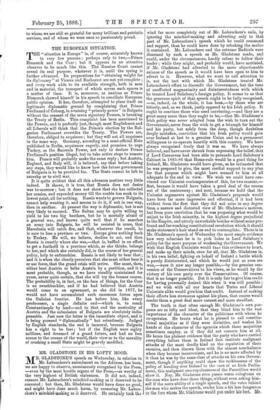THE EUROPEAN SITUATION.
THE "situation in Europe" is, of course, accurately known to very few persons ; perhaps only to two,—Prince Bismarck and the Czar ; but it appears to an attentive observer to be much like this. The Russian Court cannot reveal its real purpose, whatever it is, until the spring is further advanced. Its preparations for "obtaining weight for its diplomacy" at Vienna and Bucharest are not yet complete ; and every week adds to its available strength, both in men and in material, the transport of which across such spaces is a matter of time. It is, moreover, as anxious as Prince Bismarck showed himself in his speech to conciliate European public opinion. It has, therefore, attempted to place itself on legitimate diplomatic ground by complaining that Prince Ferdinand of Coburg, in retaining "princely power" in Bulgaria without the consent of the seven signatory Powers, is breaking the Treaty of Berlin. This complaint has been mentioned to the Powers, and is perfectly just, though most Englishmen and all Liberals will think that the Prince's election by the Bul- garian Parliament overrides the Treaty. The Powers are, therefore, obliged to acquiesce ; but they will not all acquiesce in the same way. Germany, according to a semi-official Note published in Berlin, acquiesces eagerly, and promises to urge Turkey, as the Suzerain Power, not only to declare Prince Ferdinand's position illegal, but to take active steps to remove him. France will probably make the same reply ; but Austria, England, and Italy will, it is believed, say that before taking any steps, they would like to know how the future government of Bulgaria is to be provided for. The State cannot be left to anarchy or to civil war. It is quite evident that all this advances matters very little indeed. It shows, it is true, that Russia does not desire war to-morrow ; but it does not show that she has collected her armies, and expended money till the rouble has sunk to its lowest point, all for nothing. Russia wants to govern Bulgaria, cannot help wanting it, and means to do it, if not in one way, then in another. At present the way is diplomatic, but is not very likely to succeed. The Sultan may be quite willing to yield to his two big brothers, but he is mortally afraid of a general war, and knows quite well that if he marches an army into Bulgaria, he will be resisted in arms, that Macedonia will catch fire, and that, whatever the result, he is sure to lose a province or two. Europe gives nothing back to Turkey. He will, we believe, decline to act, and then Russia is exactly where she was,—that is, baffled in an effort to get a foothold in a province which, as she thinks, belongs to her, and which she certainly did, in the course of her general policy, help to enfranchise. Russia is not likely to bear that ; and it is when she clearly perceives that she must either bear it or use force, that the grand crisis will arrive. She must, then, either beat Austria or bribe Austria by a partition, and it is most probable, though, as we have steadily maintained for years, never quite certain, that she will try the former course. The probability is, in fact, on the face of things, for the Czar is no swashbuckler, and if he had believed that Austria would come to an agreement, as she did in 1877, he would not have accumulated such enormous forces upon the Galician frontier. He has before him, like every predecessor, a single definite end—which is, to reach Constantinople by land—and to that end the neutrality of Austria and the submission of Bulgaria are absolutely indis- pensable. Just now the latter is the immediate object, and it is being pursued " diplomatically " but relentlessly. Judged by English standards, the end is immoral, because Bulgaria has a right to be free ; but if the English were eighty millions, and dreamed of a grand future, and had no free access to the oceans of the world, their view as to the morality of crushing a small State might be gravely modified.






































 Previous page
Previous page